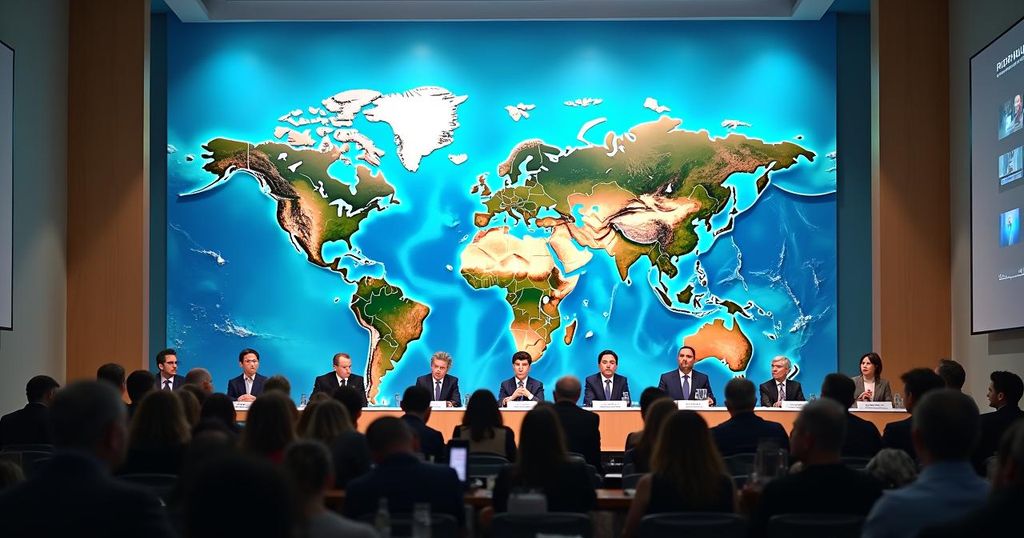COP29 Hosts Urge Nations to Unite Against Climate Change Instead of Blame

The hosts of COP29 in Azerbaijan have called for unity rather than blame in addressing climate change. As the summit approaches, significant negotiations on climate finance remain unresolved, with pressure for developed nations to increase their contributions and include all major emitters in the funding framework, amidst ongoing tensions around fossil fuel dependency and climate commitments.
The upcoming COP29 climate summit host, Azerbaijan, has urged nations to refrain from assigning blame for climate change and instead collaboratively address the pressing issue of global warming. With only a month remaining until the conference, held in the oil-rich nation of Azerbaijan, significant tensions exist around a new financial agreement that could potentially allocate billions of dollars to support developing nations combat climate change. Azerbaijan initiated a two-day preliminary meeting in its capital, Baku, aimed at creating a foundation for productive discussions prior to the main summit commencing on November 11. President Ilham Aliyev emphasized the necessity for countries to engage in constructive dialogues in the interest of global welfare, stating that while recognizing differing responsibilities among nations is essential, it is equally important to move past blame-shifting to foster cooperation. “We cannot afford to waste time on defining who is guilty for global warming, or who caused more environmental harm,” President Aliyev remarked. COP29 President Mukhtar Babayev, who simultaneously serves as Azerbaijan’s ecology minister and has extensive ties to the national oil sector, reinforced the need for decisive actions among negotiating parties, alluding to the complexities and high stakes surrounding the agenda. He disclosed that the current annual commitment of $100 billion from developed nations to assist poorer countries in emission reductions and adaptation, set to expire next year, is insufficient in addressing the magnitude of the ecological crisis. Additionally, there is pressure to finalize an updated financial figure, with proposals exceeding $1 trillion in the discussions. However, donor nations have yet to declare their financial contributions while also advocating for equitable participation from other major emitters, particularly China. Despite a lack of substantial progress in preceding negotiations, Babayev noted potential avenues for constructive developments. He called for nations to take tangible responsibility in identifying a financial commitment and to put forth viable solutions. Azerbaijan, which has pledged to increase fossil fuel outputs while advocating for climate action, faces scrutiny regarding its commitment to the global shift toward renewable energy sources, a consensus reached during last year’s COP summit in the UAE. In addressing the assembly, the UN climate chief, Simon Stiell, conveyed a clear message that COP29 must generate definitive outcomes translating prior pledges into meaningful action.
The COP29 climate summit is a critical platform for nations to address the multifaceted challenges posed by climate change. As the event approaches, the host country, Azerbaijan, is keen to facilitate productive discussions that focus on collaboration rather than blame. This year’s talks are especially pertinent given the urgency for a new financial commitment to support developing nations in their climate efforts, succeeding the previous agreement of $100 billion per year set to expire soon. The context involves complex geopolitical dynamics where rich nations are urged to fulfill their financial pledges while newer economic powers like China are increasingly being called upon for their share of responsibilities.
In summation, the COP29 host nation, Azerbaijan, urges global leaders to prioritize collaboration in combating climate change over the counterproductive practice of placing blame. With essential financial discussions pending, the need for a robust and expansive climate finance agreement is increasingly urgent. Furthermore, Azerbaijan’s dual role as a fossil fuel producer and host of climate talks highlights the ongoing tension between energy demands and ecological imperatives, which needs addressing as the summit nears.
Original Source: www.france24.com








